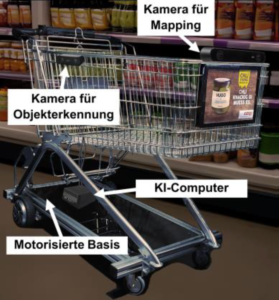VIRAS
Robot-assisted shopping for people with visual impairments
Type of project: Prototype
Disability concerned: Visual impairment
Topics: Autonomy, Participation in cultural life, sports and leisure activities
Status: Completed
The VIRAS project involves the development of an innovative and accessible shopping aid for blind and partially-sighted people. VIRAS is an autonomous shopping trolley that enables people to do their shopping independently in a supermarket.
There are currently around 377,000 visually impaired people living in Switzerland, 50,000 of whom are completely blind. In total, this represents more than 4% of the Swiss population. Because of their visual impairment, this demographic group faces daily challenges that affect different areas of life, such as food shopping. The variability of product placement, coupled with the complexity and frequency of changing shop layouts, represents a major challenge for those affected when it comes to finding specific items. In addition, lack of access to product information makes it difficult to obtain important details such as ingredients or prices. The reduced availability of shop staff compounds these barriers. As a result, the independence and autonomy of visually impaired people when shopping is considerably reduced.
The aim of the project is therefore to develop a prototype shopping aid to help blind and partially-sighted people navigate supermarkets and identify products. This should offer the people concerned new opportunities for greater autonomy and flexibility when shopping for food products.
As part of the Innovation Booster programme, the prototype was completed. It can now be used to navigate to products using a motorised chassis. The prototype is currently controlled by buttons. However, an initial mapping of the environment has been carried out. Different products are detected by the system and the user can be guided acoustically towards them and, if necessary, corrected. To do this, the user’s hand is detected and the distance between the product and the hand is determined. At the start of shopping, the shopping list can also be communicated vocally via the headset.
From a professional point of view, working on this project has enabled the team to acquire the skills needed to develop accessible technologies. To this end, it has improved its knowledge in the fields of machine learning, computer vision, SLAM and marketing. The team has learned to analyse complex problems and work together to develop innovative solutions that offer a real benefit to a specific group of users.
From an interpersonal point of view, working with the people involved has helped to develop an understanding of their challenges. The team has learnt how important it is to facilitate the daily lives of people who need help with their own specialist knowledge, and how effective collaboration helps to achieve common goals.
The shopping trolley will also be accessible to the elderly and people with reduced mobility, and the equipment will be adapted accordingly. Cooperation with OST’s Institute for Research on Ageing is already in place for this purpose.
Another prototype will also merge the 3D mapping of the supermarket with the motorised shopping trolley, so that the trolley can move around completely autonomously.
Automation of product recognition is also envisaged, given the large number of different products. To achieve this, a corresponding deep learning model will be trained using a large set of synthetic data.
The aim is also to work with a retail company to test and use the trolley in a supermarket environment.

